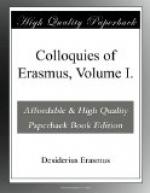Me tuo longas
pereunte noctes,
Lydia,
dormis.
For if the Accent be on me being short, and tu be pronounc’d short, it is one Word metuo; that is, timeo, I am afraid: Although this Ambiguity lies not in the Accent only, but also arises from the Composition.
They have brought another Example out of Virgil:
Heu quia nam tanti cinxerunt aethera nymbi!
Although here also the Ambiguity lies in the Composition.
Hi. Leonard, These Things are indeed Niceties, worthy to be known; but in the mean Time, I’m afraid our Entertainment should seem rather a Sophistical one, than a Poetical one: At another Time, if you please, we’ll hunt Niceties and Criticisms for a whole Day together.
Le. That is as much as to say, we’ll hunt for Wood in a Grove, or seek for Water in the Sea.
Hi. Where is my Mouse?
Mou. Here he is.
Hi. Bid Margaret bring up the Sweet-Meats.
Mus. I go, Sir.
Hi. What! do you come again empty-handed?
Mus. She says, she never thought of any Sweet-Meats, and that you have sat long enough already.
Hi. I am afraid, if we should philosophize any longer, she’ll come and overthrow the Table, as Xantippe did to Socrates; therefore it is better for us to take our Sweet-Meats in the Garden; and there we may walk and talk freely; and let every one gather what Fruit he likes best off of the Trees.




